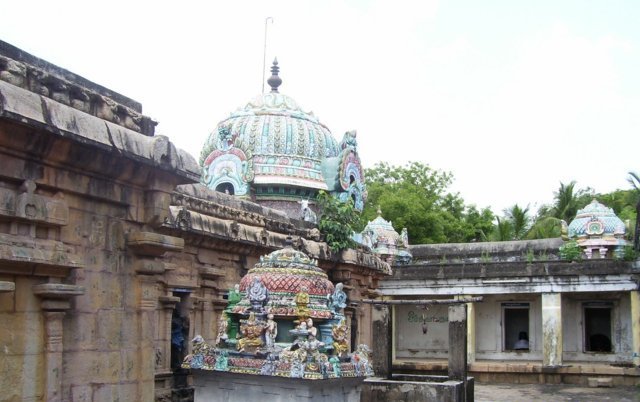Kokileswarar Temple, Thirukkozhambam, Thanjavur
Kokileswarar Temple is a Hindu
temple located at Thirukkozhambam in the Thanjavur district of Tamilnadu, India. The temple is dedicated to Shiva. The temple is under the administration of
Tiruvavaduthurai Aadheenam. This is considered to be the 35th in the series of
Tevara Stalams in the Chola kingdom located south of the river Kaveri.
Thiruganasambhandar and Appar have sung hymns in praise
of Lord Shiva of this temple. This Shivastalam is located in the vicinity of Tiruvavaduthurai
at a distance of 5 km from the Narasinganpettai railway station. This shrine is
also known as Kokilapuram.
Significance
Lord Shiva is a swayambumurthy in the temple. The Bana
part of the Linga is big in size. The foot prints of a cow are visible on the
Aavudaiyar of the Linga – Peeta, indicating the penance of Mother Parvathi in
the form of a cow.
The place is surrounded by many historically famous
temples praised in Thevaram hymns as Tirunallam (Konerirajapuram), Vaigal Mada
temple, Tiruneelakudi, Thenkurangadu Thurai, Tiruveezhimizhalai, Tirumeeyachur,
etc. In Tiruveezhimizhalai, Lord Shiva graces in the name of Mappillai
Swami.
Legends
Lord Shiva and Lord Vishnu played chess (Chokkattan in
Tamil) with Mother Parvathi as referee. During the play, Lord Shiva asked
Parvati’s opinion in rolling the play stick. Her opinion favoured Lord
Vishnu. Angry Shiva cursed Parvathi be born a cow on earth. Mother
chose this place for her penance and joined her Lord.
Lord Vishnu and Lord Brahamma in their contest to find
the head and foot of Lord Shiva respectively, Brahmma though failed in the
race, brought the Thazhambu flower as a false witness to win the contest.
Knowing his design, Lord Shiva punished him. Brahmma came to this place,
created a spring in his name, worshipped Lord Shiva and got relieved of the
dosha.
A Vidyadhara, Chandan by name was born a nightingale
(Kokilam in Tamil) due to curse of Indira. He came to this place in his
nightingale form worshipped Lord and regained his original form. As a
Kokila (nightingale) worshipped Lord here, He is praised and as
Kokileswarar. Indira too performed penance here for long years for relief
from the curse of Sage Gautama.
The Temple
The temple occupies an area of about 2 acres. Hoof marks
of a cow are seen on the Shivalingam. The sanctum faces east. Images of
Bhikshandakar, Sattanathar and Natarajar adorn the niches of the sanctum in
addition to the usual set of deities that are associated with the goshtams in a
Saivite sanctum. This temple is attributed to the pious Chola queen Sembian
Mahadevi. The temple is under the administration of the Tiruvaduthurai Adheenam.
Names of
God: Sri Kokileswarar, Sri Kozhambanathar
Name of Goddess: Sri Soundara Nayaki
Holy
water (Theertham): Brahma Theertham
Sacred
Tree (Sthala Vriksham): Vilvam, Jasmine
Temple Opening Time
The temple is open from 9.00 a.m. to 12.00 a.m. and from
4.00 p.m. to 6.00 p.m.
Singers
Saints Tirunavukkarasar and Thirugnana Sambandar had
sung the glory of the Lord of this temple in their Thevaram hymns. This
is the 35th Lord Shiva temple on the southern bank of Cauvery praised in hymns.
Festivals
Karthikai Mondays in November-December and Panguni
Uthiram in March-April are festive events in the temple.
Prayers
Prayers are submitted for relief from curses. Devotees
perform abishek to Lord and Mother offering vastras. They also contribute for
the renovation of the temple.
Contact
Sri Kokileswarar Temple,
Thirukkozhambam – 612 205,
Thanjavur district
Phone: +91- 4364-232
055, 232 005.
Connectivity
Tiru Kuzhambiam is on the Kumbakonam-Mayiladuthurai
route. It is 5 km east of Tiruvavaduthurai. Auto facilities are available at
Tiruvavaduthurai. Nearest railway Station is located at Kumbakonam &
Nearest Airport is located at Trichy.
This Shivasthalam temple is located 20 Kms from
Kumbakonam. From Kumbakonam, one has to travel on the Karaikkal road and reach S.
Pudur village and travel north on a branch road which leads us to Thirukkozhambam.











